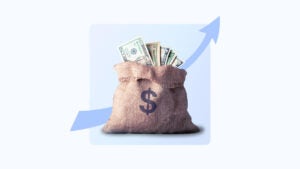What is a bad credit business loan and how it works

Key takeaways
- Bad credit business loans are a great financing option for businesses with poor credit.
- These types of loans are widely available through online lenders.
- Compared to traditional business loans, bad credit business loans have higher interest rates.
When you have bad credit, obtaining a business loan may appear beyond reach. This can be an especially challenging predicament when your business is strapped for cash or is facing an emergency.
While it’s true that lenders prefer applicants to have a good-to-excellent credit, there are still options for business owners who don’t meet this criteria. In most cases, the loan will cost you more in the form of a higher interest rate, or you may need to put collateral on the line to secure the loan. Sometimes you may need to do both.
If you do your research and shop around, it is possible to secure funding.
What is a bad credit business loan?
A bad credit business loan is any loan product designed for business owners with poor credit. They have lower credit score requirements and more relaxed eligibility requirements.
Because the lender is taking more risk to lend money, bad credit business loans come with higher interest rates and fees and may require more assurances that you won’t default on the loan. Shopping around and applying for multiple loans can help you find a lower rate, but the APR will still be higher than what you would find on the average loan.
There are many different types of small business loans for bad credit.
| Loan type | Description |
| Term loans | A loan used for various business expenses that is repaid according to a fixed schedule. |
| Microloans | A small business loan of $500 to $50,000 provided by a local non-profit organization and backed by the SBA. |
| Secured loans | A business loan secured by collateral, often an asset such as property or equipment. |
| Invoice factoring | A short-term loan that requires a business to sell its invoices to receive 85 percent to 90 percent of the invoice value. |
| Invoice financing | A short-term loan that uses accounts receivables as collateral for an advance of 85 percent to 90 percent of the invoice amount. |
| Equipment financing | A loan used to purchase business equipment. |
| Merchant cash advances | A short-term loan that pays a lump sum based on the business’s future debit and credit card sales. |
| Working capital loans | A loan covering day-to-day operating expenses. |
What is a bad credit score?
For most small business loans, a bad credit score typically refers to a personal credit score below 580. Many lenders focus on your personal credit because smaller or newer businesses often haven’t had the time to build a business credit history.
Some lenders may also consider your business credit score, especially those offering larger loans or requiring longer time in business. However, this generally applies to more established companies with a track record of using credit under the business’s name.
Business credit scoring models vary, and may include multiple scores and ratings to assess creditworthiness. Some, such as Experian and Dun & Bradstreet, provide scores that range from 1 to 100, with scores from 1 to 49 indicating a high risk to lenders.
If you’re unable to qualify for a loan due to poor credit, consider alternative lending sources that may offer small business loans with no credit check.
How a bad credit business loan works
A bad credit business loan is what some lenders offer to small business owners with poor personal or business credit. Once you find a lender and loan that meet your needs, you’ll apply for the loan and, if approved, receive a loan contract to sign. The lender will then send you the funds you were approved for.
It’s important to understand how a bad credit business loan works and what to look for.
Application process
The application process can differ by lender and loan type. Online lenders often require minimal paperwork and documentation, and usually make a decision within 72 hours of applying. Traditional lenders typically have a more lengthy application process and may require additional documentation to assess your risk. It can also take a week or more to get a decision.
Repayment terms
Repayment terms will also vary for business loans with bad credit. Some lenders or loan types, such as merchant cash advances, require daily or weekly repayments until the advance is fully repaid. Most term and secured loans have a predictable monthly payment with repayment terms of a year or more.
Costs
Since lenders take on more risk by working with borrowers who have poor credit, bad credit business loans often carry higher interest rates and fees. Rates can range from 20 percent to 99 percent or higher, depending on the loan type and your borrower profile.
Additional fees, such as origination, application or prepayment penalties, may also apply, so it’s important to review the loan agreement carefully to ensure you understand the true cost of financing.
Lenders that offer small business loans for bad credit may use factor rates instead of interest rates. Make sure to convert factor rates to interest rates to see the true cost of your loan and easily compare options.
How to protect yourself from predatory lending
Unfortunately, some lenders prey on borrowers with bad credit knowing that your options are likely to be limited. Loans from these types of lenders can be devastating for your finances and your credit.
You can take steps to identify predatory lenders before it’s too late. For instance, prior to signing on for any loan, always compare the rates and fees being offered by the lender to those available from other lenders. It’s also a good idea to research current market rates. Predatory lenders tend to charge extremely high interest rates. Conversely, if a lender’s rate seems excessively low, there may be some catch associated with the loan.
Similarly, lenders may charge excessive and unnecessary fees. Be sure to read a loan contract carefully.
It’s also a good idea to read customer reviews for a lender before signing a loan contract. This can help you gauge what type of experience other borrowers have had. Predatory lenders may also try to rush you through signing a contract or ask you to sign a document that includes blanks on it, both of which are red flags.
Pros and cons of bad credit business loans
Before proceeding with a bad credit business loan, consider the benefits and drawbacks carefully.

Pros
- Flexible qualification criteria. Bad credit business loans often feature more lenient eligibility requirements.
- Fast funding. Depending on the lender, you may receive funding in as little as 24 to 72 hours after being approved.

Cons
- Higher interest rates. With a subpar credit score, you will generally be required to pay far higher interest rates than other borrowers to help offset the risk lenders take.
- Risking your collateral. Putting valuable assets on the line as collateral to obtain a loan can be risky. If you are unable to continue making payments on your loan, you may lose those assets.
Some of the best bad credit business loans have competitive interest rates and can be funded quickly. Bankrate’s top choices include:
How to qualify for a bad credit business loan
While it can be a struggle to find a small business loan with no credit check, it is possible to get a loan even if you have bad credit.
To increase your chances of getting approved for a loan with bad credit, the best thing you can do is improve your credit score before applying. If you can pay down an existing loan, make a few on-time payments or responsibly manage a business credit card, you may have a better chance of approval as you’ll appear less risky to a lender. You can also try finding a co-signer with better credit and updating your business plan to show you’re serious about your business and its finances.
Though you can’t change how long you’ve been in business, you can focus on lenders who work with newer businesses, including startups. If you already have a business bank account, consider checking with that financial institution to find out if you qualify for a business loan. Having an existing relationship with a positive financial history may improve your chances of getting approved.
Finally, be sure to only ask for a funding amount you can comfortably repay. Lenders will look at your current cash flow, annual revenue and existing debt, so you’ll want to request an amount that fits in your business budget.
Bottom line
There are many different types of loans available for business owners with bad credit including microloans, secured loans and invoice factoring. Depending on the type of loan and the lender, it may be possible to get funding in as quickly as 24 to 72 hours. But before proceeding with this type of loan, due diligence is essential to ensure the loan you’re considering is in your businesses’ best interest and allows for achieving financial goals without creating a cycle of debt that cannot be escaped.
Frequently asked questions
Why we ask for feedback Your feedback helps us improve our content and services. It takes less than a minute to complete.
Your responses are anonymous and will only be used for improving our website.
You may also like

Best low-interest business loans for bad credit

Types of bad credit business loans

Where to get a bad credit business loan




